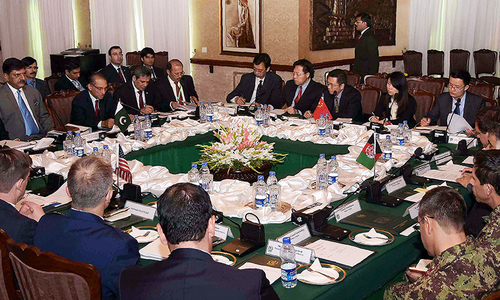Afghan Taliban not yet ready for talks: Sartaj Aziz
ISLAMABAD: Adviser to Prime Minister on Foreign Affairs Sartaj Aziz on Friday said that the Afghan Taliban have not yet responded positively to the efforts made by the Quadrilateral Coordination Group (QCG) to revive talks between them and the Afghan government.
Addressing the fifth round of Pakistan-Afghanistan dialogue organized by Regional Peace Institute, Aziz said that QCG comprising Afghanistan, Pakistan, US and China, has been making joint efforts for reviving direct talks between the Afghan Government and Taliban but Taliban have not yet responded positively to these efforts.
Related: Four-nation group terms talks 'only option' for durable Afghan peace
He, however, expressed hope that that QCG countries in line with their shared responsibility would continue efforts for such talks to bring peace and stability to Pakistan.
Reminding the participants about Pakistan's efforts in this regard, Aziz said that apart from facilitating direct talks between the Afghan government and Taliban last year, Pakistan hosted the fifth Ministerial Conference of the Heart of Asia-Istanbul Process which reaffirmed the commitment of the participating and supporting countries for regional peace.
He stressed upon need for wide ranging discussions between Pakistan and Afghanistan at all levels and said that Pakistan is ready to engage with its neighbour at all levels to restore trust and strengthen bilateral relations.
Related: Afghan president calls on Pakistan to battle Taliban
The challenges
Aziz mentioned the following:
Prolonged political instability in Afghanistan had created a fertile ground for foreign meddling after 9/11. Many different militant groups have become increasingly dominant in the security landscape with growing insurgency in different parts of Afghanistan.
The announcement of the death of Mullah Omar in July 2015 not only scuttled the Afghan peace process, it also led to the splintering of the Taliban.
Negative statements about Pakistan emanating from Afghanistan tend to impede the constructive bilateral engagement. Pakistan as a policy has continued to show restraint in responding to such negative remarks.
Vested interests have often tried to create a perception that Pakistan actually controls the Taliban. Such an impression breeds unrealistic expectations from Pakistan. The mistrust between the two countries has also affected on the efforts for peace and stability in Afghanistan.
The return of Afghan refugees is also a major challenge in Pakistan-Afghanistan relations. Over three million Afghan refugees are present in Pakistan. Besides being a continuing economic burden, refugee camps have also become a security concern as they provide sanctuary to terrorists and insurgents.
Long porous border between Afghanistan and Pakistan is frequently used by miscreants including terrorists, militants, human and drug traffickers and criminals. For effective counter terrorism, border controls to regulate the movements across the border is vital.













































